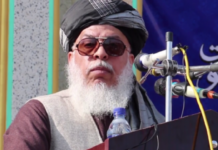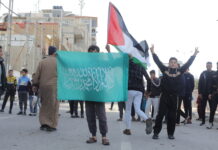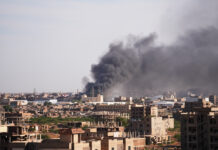Muslim members of the Kenyan parliament (particularly those of Somali origin) warned the government not to send troops into its “troubled” neighbour Somalia in mid-2011. Mohammed Kahiye in Nairobi writes that the plan was always destined to fail due to the complexities of tribal-based conflict in Somalia which the Kenyan government ignored to protect its own national security.
A few days later the Minister of Internal Security declared a war on the Al-Shabab militia instead of the president as per the country’s constitutional requirement while sitting next to the Minister of Defense in a press conference.
The Kenyan military then opened a new chapter in the regional history of warfare by capturing the Somali port city of Kismayo. Kenyan soldiers dared where the US army failed and analysts were quick to say that the victory proved Kenyan forces were equal to any military assignment, but the warning of Muslim MPs against this military intervention will haunt Kenya as the ongoing conflict unfolds.
Somalia’s power vacuum
Commander Sheikh Ahmed Madobe of the Raskamboni Brigade who fought alongside the Kenyan military which forced Al-Shabab out of the port city of Kismayo was elected as the President of Jubaland. However, controversial and powerful warlord Bare Hirale who previously controlled the area rejected Madobe’s electoral victory and declared himself as the president of the state.
Subscribe to our newsletter and stay updated on the latest news and updates from around the Muslim world!
This sparked further tension in an already volatile tribal-based conflict in the Horn of Africa. Last week vicious fighting between Madobe and Hirale supporters resulted in the highest number of casualties recorded in Jubaland, dozens of civilians died including fighters from both sides.
Madobe enjoys the support of Kenyan forces due to his frontline role during the earlier days of military confrontation with Al-Shabab in Kismayo. On his part, Hirale who once served as the minister of defense in the former transitional federal government, feels he is safeguarding the interest of his clan in the region from what he believes as a Kenyan-backed government in Jubaland.
Mediation efforts
Efforts by the government of President Hassan Sheikh Mohamud to intervene in the situation to bring the warring factions to the negotiating table and end the atrocities has faced several setbacks from AMISOM forces and the leaders of opposition parties.
In May, a fact-finding mission composed of ten Somali parliamentarians led to the spat of political infighting in Jubaland when they accused Kenyan forces of refusing to provide them security.
In November 2012, a special presidential task force from Mogadishu was turned away from Kismayu airport by the interim administration and Kenyan commanders for what they described as “security reasons.”
And just recently, AMISOM’s “Section Two” forces (which include Kenyan soldiers) arrested a government-appointed division, 43 Somali National Army commanders and Colonel Abbas Ibrahim Gurey who is the Deputy Minister for Information.
A statement from the Prime Minister’s media office in Mogadishu stated that the government regretted the national loss of the three days of fighting in Kismayo and called for the replacement of AMISOM Section Two forces, to what the he described as a more “neutral” African Union peace keeping force.
Quagmire
Now, a controversial motion in Somalia’s parliament is calling for the replacement of army commanders in Kismayo as well as relocating Kenyan Defense Forces (KDF) to other regions or mixing them with other African peacekeepers.
Without giving any further information on the topic of the conflict in Kismayu, government lawmaker, Abdullah Jama, said to 5 Pillarz: “Negotiations are on-going. We have met with individuals who are calling for caution. We want them to convince us. If they do so, we will reconsider our strategy. If not, we will go ahead with it.”






















